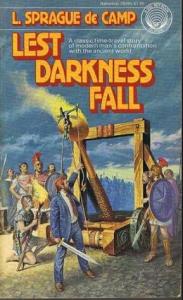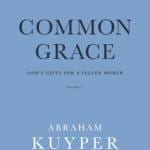While I am generally a fan of science fiction, there are two streams of it which I don’t much care for: time travel and parallel realities. No doubt these can be done well, but most of the time (especially on television) they’re merely a way for writers to be lazy. So when I come across a story in either of these categories that is actually worthwhile, it is worth special note. L. Sprague de Camp’s Lest Darkness Fall is one such story. I suppose it helps that it is one of the earliest such stories, really only preceded by Mark Twain’s Connecticut Yankee in King Arthur’s Court and H.G. Wells’ The Time Machine (the former of which de Camp’s story is clearly inspired by).
Lest Darkness Fall is the story of Martin Padway falls through a time hole from Rome in 1938 to Rome in 535. Fortunately, he is an archaeologist specializing in the ancient world, so the languages (Latin, Greek, and Gothic) are not the barrier they would be for you and me. De Camp even has an interesting device where he dodges the problem of paradox–i.e. the danger that Martin might change the past so much that he is never born. The idea presented by the book is that history is like a tree, and that if you slip down the trunk of it either you’ll functionally make no impression (say, if for example you accidentally end up in the middle of the ocean and get eaten by a shark) or you’ll make such a large impression that a new branch is begun. Martin resolves at the beginning to not only make a new branch, but to do so by preventing the rise of the Dark Ages.

His goal is to stop the war between the ‘Greeks’ (the Byzantine Empire) and the ‘Romans’ (the Goths who have conquered Italy) that he knows will eventually devastate the peninsula, weakening both peoples so that when the Muslims rise and attack the Byzantines and the Lombards march south and attack the Goths, both peoples collapse and the Dark Ages descend on Western Europe. Aside from debate about whether or not there really was a “Dark Ages” (I’m in the ever-smaller ‘there was’ camp, but that’s an argument for another day), or debates about whether this was the moment that really marked the end of the Classical world and the rise of the Middle Ages, there are questions we should ask about the assumptions Martin makes.
Specifically, Martin sets about ‘saving the world’ by introducing a number of modern technologies. Of course, like any archaeologist–at least like my stereotypical vision of any archaeologist–he’s not much at chemistry, physics, or the other necessary sciences for building modern technology. But he can at least start a rudimentary printing press, a rough telegraph, and the outlines of modern accounting.
These technological innovations, combined with Martin’s knowledge of major future events–such as Belisarius’ invasion of Italy or the assassination of the Gothic king–and his steadfast refusal to take a side in the theological debates of the day, give him the edge needed to keep the flame of civilization alive and prevent the fall of the Dark Ages (hence the title).
This book is well-written and fun, and if you come across it you should definitely read it. It is especially interesting when we remember that this was written in the late 1930s, when it very much looked like darkness was once again about to fall across the world. But that setting should also remind us that this is a fairly naive view of history, civilization, and human nature. A bit of technological innovation is not really the line between civilization and savagery. The telegraph would not have prevented the collapse of society in the sixth century any more than better technology would have kept the Nazis from rising the power in the first place in the beginning of the 20th century. For that matter, technology usually helped the totalitarian regimes rise to power.
What do we need instead? Well, the nature of the rise and preservation of civilization is a complex question for another setting. The good news is, the Gospel is for everyone and applies in every situation. Whether at the height of civilization or in the worst squalor of barbarism, we all need the forgiveness that comes through repentance and faith in Jesus Christ. Which isn’t to say we can’t work to preserve our own little corner of civilization–we can and we should. But it is to say that the fall of darkness in that sense shouldn’t be our biggest concern.
Dr. Coyle Neal is co-host of the City of Man Podcast and an Associate Professor of Political Science at Southwest Baptist University in Bolivar, MO












